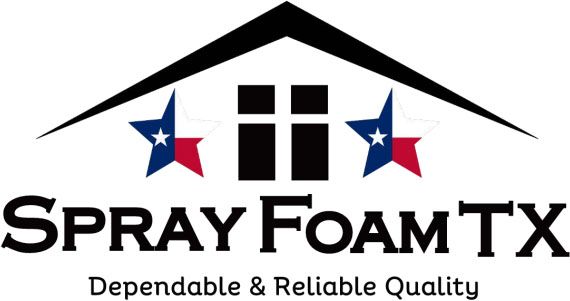FAQs
Spray Foam TX
Have an insulation-related question? We have the answer. Check out these FAQs and give us a call today for more information!
-
What is spray foam insulation?
It’s a type of insulation that is sprayed onto surfaces in liquid form. When applied, it expands and hardens to form a solid barrier that helps with temperature regulation, soundproofing, and energy efficiency.
-
How does spray foam insulation work?
It works by expanding to fill gaps, cracks, and crevices, creating an airtight seal. It prevents heat from escaping in the winter and entering in the summer, keeping your home or building more energy efficient.
-
What are the benefits of spray foam insulation?
- Energy Efficiency: Reduces air leakage, improving heating and cooling efficiency.
- Moisture Resistance: Helps protect against mold and mildew by creating a moisture barrier.
- Soundproofing: Foam provides sound insulation, reducing noise between rooms.
- Long-Lasting: Has a longer lifespan than traditional insulation materials.
- Environmental Impact: Helps reduce your carbon footprint by making homes more energy efficient.
-
Is spray foam insulation safe?
Yes, spray foam insulation is safe for residential and commercial use. Spray Foam TX uses high-quality materials that are approved for use in buildings, and we ensure proper ventilation during installation.
-
How long does spray foam insulation last?
It can last the lifetime of your building when properly installed. It will not sag, settle, or degrade over time like some traditional insulation types.
-
What types of spray foam insulation are available?
- Closed-cell spray foam: This is denser and more rigid, providing better insulation values and moisture resistance. It’s ideal for areas prone to water exposure.
- Open-cell spray foam: This is lighter and more flexible, suitable for soundproofing and areas where moisture resistance is less of a concern.
-
How long does it take to install spray foam insulation?
It depends on the size of the area to be insulated. Usually, spray foam insulation can be applied in one day for most homes or small commercial spaces. After the application is completed, it takes about 24-48 hours to fully cure.
-
Will spray foam insulation improve my home’s energy efficiency?
Yes, it reduces air leakage, helping to stabilize indoor temperatures. Your heating and cooling systems won’t have to work as hard, potentially reducing energy bills.
-
Can spray foam be applied to existing homes or buildings?
Yes, spray foam insulation can be applied to new constructions or retrofitted into existing homes, including attics, walls, basements, and crawl spaces.
-
Is there a difference between spray foam insulation and fiberglass insulation?
Yes, unlike fiberglass, spray foam expands upon application, filling gaps and cracks to create a seamless barrier. It has a higher R-value (insulating capacity) per inch compared to fiberglass. It offers superior performance in preventing heat loss.
-
How much does spray foam insulation cost?
This varies depending on the size of the area to be insulated, the type of foam, and other factors including accessibility. The long-term energy savings typically offset the initial investment over time.
-
Is spray foam insulation eco-friendly?
It can be eco-friendly, especially if made with renewable or low-GWP (global warming potential) blowing agents. It also helps reduce energy consumption, which lowers carbon emissions. It can be a more sustainable option compared to fiberglass or cellulose.
-
Can I install spray foam insulation myself?
We do not recommend DIY installation. Improper application can lead to poor performance, health risks, or damage to your property. Hire a licensed and insured professional.
-
How do I maintain spray foam insulation?
There is little to no maintenance once it’s properly installed. It’s a good idea to inspect the foam for damage or wear if there are issues with temperature regulation or moisture in the area.
-
Is spray foam insulation fire-resistant?
Closed-cell spray foam insulation is fire-resistant, but it is not entirely fireproof. It usually meets fire safety standards and slows down the spread of flames. You should always consult local building codes for specific requirements.
-
Will spray foam insulation help with allergies?
Yes, it can improve indoor air quality by reducing the amount of dust, pollen, and other allergens that can enter your property through cracks and gaps.
-
What is the R-value of spray foam insulation?
It depends on the type (closed-cell or open-cell) and thickness applied. Closed-cell foam offers an R-value of 6-7 per inch, open-cell foam offers an R-value of 3.5-4 per inch.
-
Is there any odor associated with spray foam insulation?
It may emit a slight odor when applied, but it usually dissipates within a few hours. We ensure proper ventilation during installation to minimize exposure to fumes. The area can be re-entered once the foam has cured.
-
What should I do before installation?
Make sure the area is cleared of furniture and any obstructions. Our team will also check for moisture issues. It’s essential to address any water concerns before applying foam insulation.
-
How do I get an estimate for spray foam insulation?
To get an accurate estimate, contact us for a free consultation. We’ll assess your home or building, discuss your insulation needs, and provide a detailed, no-obligation estimate.
Learn More About
Spray Foam TX
Serving Northeast Texas and Southern Oklahoma, Spray Foam TX specializes in open-cell, closed-cell, cellulose, and fiberglass insulation services. Committed to quality. Over 21 years of construction experience. Fully insured. Call today.
serving Area
Northeast Texas
Southern Oklahoma
and surrounding areas
Business Hours
- Mon - Fri
- -
- Sat - Sun
- Closed
Saturday by Appointment Only


Share On: